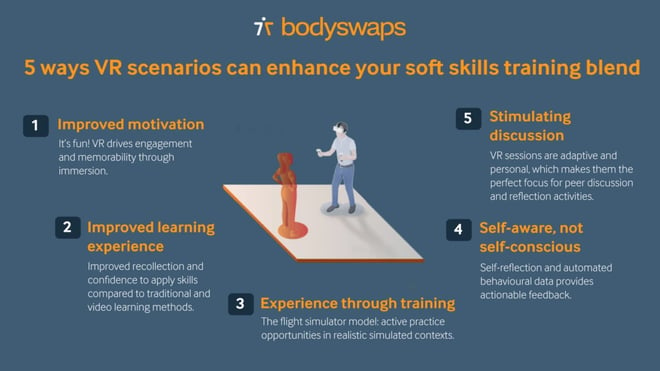If there’s one thing Covid-19 has shown us, it’s the value of incorporating digital components in remote education and training. And while many students returned to college campuses this week, blended learning looks to be here to stay.
Models of blended learning are as varied as the topics they can be used to teach, with multiple different digital components that can be combined in varying proportions to create a rich, engaging and effective blend.
In a recent collaboration with a major UK rail network, Bodyswaps created virtual reality customer service scenarios as part of a blend that also incorporated webinars, e-learning, video (standard, interactive and 360), animation and independent reflective practice.
In this blog post, we explore five ways that VR solutions can enhance your soft skills training blend.

#1 Improved motivation
For blended learning programmes to be effective, it is imperative that individuals are motivated to learn.
Learners often report poor motivation on courses that lack interactivity, relevance or application. By contrast, when Walmart introduced VR to its training offering, Senior director of digital operations Brock McKeel reported “associates standing in line to get trained” - something that “never normally happens”.
#2 Improved learning experience
The anticipation of a new and innovative learning intervention can create a buzz among learners and educators alike, that heightens interest and motivation. But VR simulations offer more than mere novelty.
In studies comparing traditional, VR and video learning conditions, participants showed higher engagement, improved recollection, increased positive emotions and decreased negative emotions in VR than those in the traditional and video conditions, leading researchers to conclude that overall, VR displayed an improved learning experience when compared with traditional and video learning methods.
#3 Experience through training
We often advocate VR training solutions as standalone learning resources, but adding VR to your soft skills training blend is an ideal way to give learners experience through training.
Learning the fundamentals is one thing, but applying them to real-life situations is quite another - unless you give your learners the opportunity to apply them to theoretical situations first.
Virtual reality supports experiential learning like no other medium. Using a combination of immersive environments, interactive characters, impactful storytelling and AI-powered data, immersive learning lets learners apply their skills autonomously in realistic workplace scenarios
Jeremy Bailenson
Stanford University Communications Professor
Through VR, theory and practice are brought together with dynamic representations of reality where it is safe to practise and apply skills that would otherwise be too difficult, too dangerous or too expensive to recreate in the real world.
VR is well-established for teaching high-risk technical skills. But it can also create a psychologically safe space for practising soft skills. To paraphrase:
Kristin M. Murphy
Associate Professor of Special Education#4 Self-aware, not self-conscious
It’s no accident that our immersive soft skills solutions cater to the independent learner, rather than facilitating role play in a virtual group setting as some VR platforms do.
Role play is one of those activities that so many people love to hate. Trainers like to use it as a ‘safe’ way to practise soft skills in a hypothetical setting, but what adult doesn’t fear humiliating themselves in front of their colleagues? And when your primary focus is on saving face, you’re unlikely to try out new approaches and learn from your mistakes.
In addition, time restraints in facilitated role play sessions often mean that, even if everyone gets to have a go, it’s unlikely that they’ll be able to have multiple attempts and as we know, practice makes perfect.
Adding VR to your soft skills learning blend supports the development of self-awareness without feeling self-conscious. Learners gain the unique ability to step into another person’s shoes and experience things from their perspective. This game-changing effect is why many VR enthusiasts describe it as the ultimate empathy machine.
During interaction with VR, AI-enabled performance analysis automatically generates an unprecedented amount of data: decision-making patterns, semantic analysis, elocution analysis, speech emotion analysis, body language data and more, which can provide completely personalised and actionable feedback, that the learner can apply to their practice immediately, building tangible competence and confidence.
Learners can repeat this cycle of performance → review → analysis until they are completely happy with their skills. They choose when to share their performance with others, if at all. But this doesn’t mean VR simulations have to be an insular experience…
#5 - Stimulating discussion
Many VR solutions also incorporate a coaching app that allows learners to share a recording of their soft-skill behaviour with a human coach. Unlike a traditional LMS that reduces a learner’s performance to an assessment score or record of completion, adding a VR solution with this feature to your blend, allows a remote tutor to view a recording of the learner’s avatar and provide objective feedback of their own.
In addition, since VR scenarios usually have multiple possible outcomes to reflect the learner’s individual choices, each learner emerges from a VR session with an experience that is uniquely personal. When used as part of a blend, this creates an ideal focus for paired or group discussions about the soft skills in question.
Adding VR to your blend
Bodyswaps offers a library of immersive learning modules around leadership, communication and employability available on VR, mobile and PC. If you’d like to learn more about adding them to your blend, check out our latest trailer and request a free demo today.






.png?width=377&height=184&name=Meta%20preview%20(3).png)


